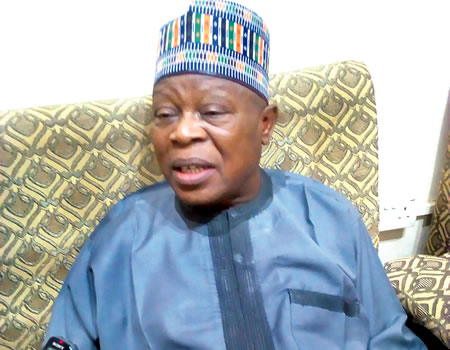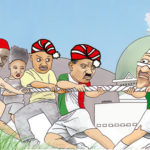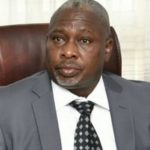Honourable Dasuki Nakande, a former Minister of State for Information and Communications, is also a chieftain of the All Progressives Congress (APC). In this interview with ISAAC SHOBAYO, he speaks on zoning, South-East presidency in 2023 and other topical issues.
SOME Nigerians, especially members of your political party, have started making conjectures about 2023. Is it not too early to begin such discourse?
It all depends on who is talking. Those in government are not talking, because they are making efforts to settle down and concentrate on governance. Go and check it; it is those political jobbers who are trying to make themselves relevant that are making this noise. There’s no basis for this kind of discussion now. Many of them lost out in the last election. They are simply trying to heat up the polity for selfish reasons.
The president and his team are working, likewise the National Assembly. So, they should be ignored. The president has appointed his ministers and advisers; he is focused on the enormity of work on ground.
During the last executive council meeting, directive was given to all the ministers not to travel out of the country in order to have sufficient time for input into the 2020 budget that has been presented. This is to enable the appropriation of the budget on time.
Your party, the APC, embraced zoning in line with its constitution. But barely eight months into the second term of the president, some leaders of the party, especially from the North, want to jettison zoning in 2023. What is your reaction to this?
The party has adopted a balanced structure which can be said to be all embracing and inclusive. Everybody is given a space, whether at party level or at the level of governance. Virtually all positions are zoned, accordingly, to make sure that every part of this country is adequately represented just to create a sense of belonging for all. Every political party in Nigeria is governed by the rule of law; party constitution is not above the Constitution of the Federal Republic of Nigeria. There is no way the constitution of Nigeria will be subservient to the constitution of a political party. So when people are talking, you need to look at the context in which they are talking. But the underlining factor is that this country is made up of so many nationalities. They must be given space and sense of belonging. I think when the time comes, everybody, including those trying to cause confusion, will know who is to produce the next president in 2023.
I don’t think that zoning should be jettisoned. That is why I said all political parties are run on the basis of their constitution and that of Nigeria. This will determine how party machineries will emerge to face another party in 2023. There’s no party that will come up with a structure skewed in favour of a particular part of the country, a particular religion or tribe, be it at the national or state level. There must be sense of balance to promote peace and harmonious relationship.
Border closure is illegal: We should stop behaving like international gansters —Junaid Mohammaed
Looking at the political calculations in the country, the South-East is clamouring for the presidency in 2023 on the premise that it remains the only part of the country that has not produced president of this country. What is your position on this?
The South-East in this dispensation has chosen to go it alone. I don’t think it is fair to say the Igbo are alienated in the scheme of things. I don’t think it will be fair to the country to say that. They have always said, during the time of former President Goodluck Jonathan, that he was their own. They gave him all kinds of name to prove that they were with him. He was called Azikiwe Ebele Jonathan. They made a proclamation to that time that all the governors in the South-East, at a meeting in Enugu, said as far as they were concerned, the South-East was with then President Jonathan.
I remember that during 2011 elections, they openly declared that they had no candidate beyond Jonathan, being their own, as their presidential candidate. Nobody alienated the South-East; nobody erected a barrier to prevent them from contesting. They formed a political party, the All Progressives Grand Alliance (APGA). The party is more of a regional political party; it does not operate beyond the shores of the South-East. There is no bridge for the party, but it remains in the South-East and it remains there still date.
The South-East has to change its style of politics. The people there should realise that they have to play national politics to win the confidence of other parts of the country. They must come out, if they are nursing the ambition of ruling the country in 2023.
The idea of winner-takes-all is said to be eroding competence in governance. Don’t you think it is high time the party in power looked beyond party members for appointments to attract professionals and technocrats to strengthening governance?
There is a shift in the whole thing. There is a small paradigm shift in place right now, especially at the federal level. President Muhammadu Buhari, of recent, brought in some professionals to strengthening his administration. Virtually all of them are not members of the APC. They don’t belong to any political party. Sometimes, political watchers in the country don’t seem to appreciate what the government is doing or what those in government are passing through. Before any action is taken, so many things need to be put into consideration. Take for example, the committee the president put in place, headed by Bismak Rewane; he is a sound financial expert in this country. He was brought in to give government advice on how best to harness all the potential of revenue at the disposal of the government so that the projection of the government can be enhanced. Though one of the highlights of his recommendations is increase of the Value Added Tax (VAT) from five per cent to 7.5 per cent, the man is a professional and nobody can associate him with any political party.
Only recently, the government set up the Economic Advisory Council, headed by Professor Doyin Salami and others. These are technocrats in their own right. They were appointed to give their contributions to the development of the country. Professor Chukwuma Soludo and Professor Ojo who are former economic adviser to the former President Jonathan are part of the team. So, it is not winner-takes-all as some people think.
The Federal Government is contemplating an increase in VAT and other forms of taxes to generate more money to finance capital projects. Do you support the idea that the government should scale down the cost of governance, instead of introducing more taxes?
Some people are looking at the cost of governance from personal perspective. It is possible, but we are not the only country in this situation. Only recently, in Italy, members of the National Assembly were reduced by a certain number. The country calculated the cost of saving that would come to the government, especially from the reduction, and pointed out what it was going to do with the savings.
So, each time we bring the argument that ‘let us reduce the cost of governance,’ let us be specific about the area. Let us think through what we are proposing and come up with solutions, so that if and when the proposals are implemented, we would know what the savings would be used for, rather than just throw it into the pool of revenue to be shared among states in the country.
In the 2020 budget before the National Assembly, education is not accorded priority, compared to other sectors. Don’t you think this will further sink the parlous state of education in the country?
The cost of governance has actually gone up. State infrastructure has also gone down. If you look at the budget of the Federal Ministry of Works that used to be the highest, it has also gone down. The government needs a lot of support from Nigerians, because we need to buy into this projection and the reality that is in the budget and give it maximum support. I agree that we need to spend more money on education, but when we are talking of education in this context, it does not mean only formal education. Currently, we need to do more of informal education, because of the high rate of unemployment in the country. It is a quick way to get our teeming youths employed; I mean self-employed people without looking for white collar jobs. If they are exposed to crafts, such tailoring, carpentry, plumbing and others, the better for the country. These are skilled services that are in high demand all the time.
So, skills acquisition should be embraced by all tiers of governments as a way of reducing unemployment. We need to look at the concept of education from different perspectives to have a lifeline for our young ones.
In the past four years, the government has been grappling with insecurity across the country. What other approach do you think can be adopted to tame the menace?
The major one, which is Boko Haram, has gone down drastically. Now, we are contending with kidnapping and banditry. As the government is making efforts to arrest one, another one is rearing its head. Banditry and kidnapping are in all parts of the country today. There is no part of the country that is spared. Last week, we learnt that an Assistant Commissioner of Police was kidnapped and later released. We don’t know if ransom was paid or not. This is very shocking, because if I, an ordinary man, am looking up to security agencies for protection, and the same security people are being kidnapped, then, what is the hope for ordinary person? It is worrisome. The government needs to restrategise.
Most of the major highways in the country now are no longer safe. Many are afraid of travelling, because they don’t know whether they would get to their destinations or not.
The security agencies need more support from the society. These people terrorising the highways and the country at large are part of the society and they live among us. So, people should be bold enough to report them to the law enforcement agencies. It should be collective responsibility, not that of the security agencies alone. We need to support them with intelligence reports.
Based on this, what is your take on state police?
Whether you enact it as a law or not, it is already here. People are coming out as volunteers. Every community now has vigilante groups. Though there are all kinds of argument and counter-arguments as to the merit and demerit of state police. To me, I will say ‘let us try it, but we need to have a deep understanding of what it is all about.
For example in Plateau State, we have 17 local government areas. Nobody will bring a state policeman from one local government to another to operate. They must be from the same area. They must have deep knowledge of their communities to be able to function effectively. I don’t think governors will use them for their personal interests, because it will be established on the basis of law.






